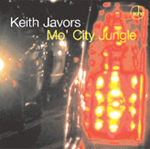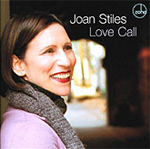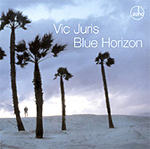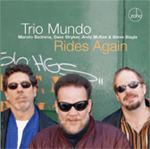| |
Label
Profile : Zoho Records
by Jay Collins
September 2004
Zoho Records, a reasonably new New York City based label, seeks to
release records that reflect "Latin/Jazz with a New York Vibe". Despite
the apparent Latin Jazz focus and the marketing hype (presenting "the
colorful sounds of New York's newest, freshest, and sharpest Latin
/ Jazz and World indie CD label!"), Zoho has offered a surprisingly
diverse range of records. Both unknowns like Keith Javors, Pablo Aslan,
and Joan Stiles and recognized, yet underrated players like Dave Liebman,
Harvie S, and Vic Juris have all been allowed an opportunity to present
their work. As for the typical reader (if one exists) of web mags
like One Final Note, the five discs considered here are generally
aimed at more mainstream audiences and may not prove to be a worthwhile
venture for some.
 First
up is pianist Keith Javors' third recording featuring a sextet
of young players with a front line of trumpeter Ray Callender, tenor
saxophonist Juan Carlos Rollan, and alto saxophonist Dane Bays. The
Javors-penned program focuses on saccharine melodic content that takes
precedence over verve. The strongest pieces are those that allow the
ensemble to charge out of the gates, like the Blakey-styled opening
stomp of "Mo' City Jungle", the 80s Blue Note era sounding
"In Essence", or the shifting tides of "Conclusion
Of The Matter", with Javors' looming modalities and fire
from Callender and Bays hinting at this ensemble's aptitude.
In fact, the real find is Bays, who rips it up with his soulful, incisive
tone on the title track and his waltzing solo feature "Ian Keith". First
up is pianist Keith Javors' third recording featuring a sextet
of young players with a front line of trumpeter Ray Callender, tenor
saxophonist Juan Carlos Rollan, and alto saxophonist Dane Bays. The
Javors-penned program focuses on saccharine melodic content that takes
precedence over verve. The strongest pieces are those that allow the
ensemble to charge out of the gates, like the Blakey-styled opening
stomp of "Mo' City Jungle", the 80s Blue Note era sounding
"In Essence", or the shifting tides of "Conclusion
Of The Matter", with Javors' looming modalities and fire
from Callender and Bays hinting at this ensemble's aptitude.
In fact, the real find is Bays, who rips it up with his soulful, incisive
tone on the title track and his waltzing solo feature "Ian Keith".
While the aforementioned pieces offer glimpses of restlessness, the
majority of the sounds heard lean towards the "Jazz Lite"
arena. Such evidence includes Rollan's showcase "Sierra
Nicole's Bossa" and the sensitive, if insipid balladry of
"The High Road". Thus, while avoiding formulaic diversity
is a noble endeavor and the group demonstrates its youthful vigor,
sensitivity and skill, one wishes the gloves would come off far more
often on this hit or miss affair.
 The liner
notes to pianist/arranger Joan Stiles' debut, Love Call, states
that the intention of the record was to create a "relaxed, loosely
swinging vibe". Putting those aims in motion, Stiles musters a cast
of wonderful ringers for this swing-based session that calls upon
guests like Clark Terry, Frank Wess, and Benny Powell, as well as
lesser-known talents Jerry Dodgion, Joe Temperley, and Warren Vaché.
Stiles makes good use of the assembled roster in settings ranging
from quartet, septet, octet and nonet settings, all pumped along by
bassist John Webber and drummer Gregory Hutchinson. The liner
notes to pianist/arranger Joan Stiles' debut, Love Call, states
that the intention of the record was to create a "relaxed, loosely
swinging vibe". Putting those aims in motion, Stiles musters a cast
of wonderful ringers for this swing-based session that calls upon
guests like Clark Terry, Frank Wess, and Benny Powell, as well as
lesser-known talents Jerry Dodgion, Joe Temperley, and Warren Vaché.
Stiles makes good use of the assembled roster in settings ranging
from quartet, septet, octet and nonet settings, all pumped along by
bassist John Webber and drummer Gregory Hutchinson.
For this program of mostly well-oiled standards, a septet begins with
the swinging Monk ode "Spherical", which sets the good-natured
tone immediately. The ensemble also thrives on the simple beauty of
the octet's rendition of "When I Fall In Love" or the
joyous bop of "Daahoud", which gets its kicks from Joe Temperley's
inspired baritone work. Although decades from his best work, Terry
makes two appearances, including a small group rendition of the Ellington
chestnut "Creole Love Call", containing a witty plunger
solo, as well as some tasteful work on "Surrey With The Fringe
On Top".
Stiles also provides herself with some room to showcase her talents
as a soloist in solo and trio settings, reflecting a range of influences
as deep as Monk to Ellington to perhaps Wyn Kelly. Her dexterity and
ability to confer emotion shines forth on the two Strayhorn solo piano
pieces, "Blood Count" and a clever arrangement of "Take
The 'A' Train", as well as the sprightly "Tea
For Two". Overall, though, Stiles is a clever arranger and a
keen player who knows how to collect a hell of an ensemble for this
immensely enjoyable record. Indeed, this is an ode to the past that
never sounds too old fashioned.
 Mango
Festival demonstrates firmly that Jazz doesn't have to be one
or two dimensional, but rather, can be a welcome home for cross-cultural
cross-pollination. For this merger of American and South Asian influences,
drummer Sunny Jain leads an ethnically diverse quintet including guitarist
Rez Abbasi, bassist Gary Wang, and tenor saxophonist Steve Welsh.
Perhaps most interesting is that this nine-song program departs rather
dramatically from the above-referenced Latin-tinged mantra, but even
more enticing is that it also draws upon elements that might even
conjure up thoughts of that dirty word—FUSION. For instance,
the introspective, flowing time of "Mango Festival" sets the course
for the rest of the program, merging the electric and acoustic with
a variety of cultural signposts. Other highlights include the vigorous
undertaking of "As Is", as well as the complex rhythms of "Horizontal
Pathway". Mango
Festival demonstrates firmly that Jazz doesn't have to be one
or two dimensional, but rather, can be a welcome home for cross-cultural
cross-pollination. For this merger of American and South Asian influences,
drummer Sunny Jain leads an ethnically diverse quintet including guitarist
Rez Abbasi, bassist Gary Wang, and tenor saxophonist Steve Welsh.
Perhaps most interesting is that this nine-song program departs rather
dramatically from the above-referenced Latin-tinged mantra, but even
more enticing is that it also draws upon elements that might even
conjure up thoughts of that dirty word—FUSION. For instance,
the introspective, flowing time of "Mango Festival" sets the course
for the rest of the program, merging the electric and acoustic with
a variety of cultural signposts. Other highlights include the vigorous
undertaking of "As Is", as well as the complex rhythms of "Horizontal
Pathway".
While Abbasi is superb throughout, his "sitar guitar" further
adds to the record's world jazz feel. It is put to good use on
the robust rendition of Wayne Shorter's "Masquelero",
a composition that suits this band well. The sunny Bollywood ditty
"Aap Jaisa Koi" and the haunting soundwaves and eventually
rolling momentum of "Silent Marches (Reghupati)" also highlight
Abbasi's underrated merits. As a final note, the electrifying
concluding notions of Abbasi's "Blu Vindaloo" features
a rollicking rhythmic groove that pushes the intricate theme along
with Abbasi and Welsh's flowing lyricism. As a whole, this is
an interesting voyage into the melding of Indian and Western Jazz
sensibilities that shows much promise for Jain's future.
 Where youthful
enthusiasm and vigor shine on Mango Festival, legendary New
York guitarist Vic Juris prefers simple elegance on Blue Horizon,
another release that proves the depth of Zoho's holdings. Juris aims
to cover a broad program of compositional and tonal voices, as Joe
Locke's malletwork glistens, Jay Anderson's bass croons and Adam Nussbaum's
kitwork tastefully sweeps the proceedings onwards. While Juris and
the rest of the ensemble rarely catch fire, Juris excels through his
elegant understatement, utilizing a warm approach that stresses the
importance of each phrase. In other words, there is no room for wasted
notes. Where youthful
enthusiasm and vigor shine on Mango Festival, legendary New
York guitarist Vic Juris prefers simple elegance on Blue Horizon,
another release that proves the depth of Zoho's holdings. Juris aims
to cover a broad program of compositional and tonal voices, as Joe
Locke's malletwork glistens, Jay Anderson's bass croons and Adam Nussbaum's
kitwork tastefully sweeps the proceedings onwards. While Juris and
the rest of the ensemble rarely catch fire, Juris excels through his
elegant understatement, utilizing a warm approach that stresses the
importance of each phrase. In other words, there is no room for wasted
notes.
Several of the numbers feature a gliding swing feel where the quartet
conjures up musical images that might remind one of something heard
ages ago on Pat Metheny's Bright Size Life or Metheny's records
with Gary Burton. Such examples include the free-flowing sheen of
"Dancing Shadows", the uppity "Labyrinth", the excitable "889", or
the quartet's tour de force, "Blue Horizon". All four tracks demonstrate
the group's ability to read each other's signals and capacity to produce
compelling music. Juris even gets a little spooky by utilizing an
alienesque tone on the cosmos-influenced "Kling On".
Juris also playfully engages the others. These interactions include
several duos, most excitingly a spirited foray with Nussbaum on "Domo
Duo", as well as the ballad, "Sunset On Vega", featuring the percussive
radiance of Jamey Haddad. Juris' delicacy, though, remains supreme
and is best witnessed during the gentle fragility of "Soft Spoken"
and the album's closer, "I've Heard That Song Before", a quiet farewell.
Looking back, Juris has participated in far more gripping and razor-sharp
sessions during his long and eventful career; however, for the uninitiated
or unsure, Blue Horizon offers much to those who have yet to
discover his brilliance.
 Trio
Mundo, a trio (here a quartet) devised around percussionist Monolo
Badrena, aims to honor joy and celebration in its music; on Rides
Again, the group further elaborates on its interpretation of essential
party ingredients. A percussionist on countless sessions who is perhaps
best known for his brief tenure with Weather Report, Badrena is in
a class that few share. What is most interesting about this recording
is that it is also Badrena's first foray as a drummer, although like
others in this elite group, like Airto or Don Alias, his natural rhythms
sound as if the kit is his primary instrument. Badrena fills in virtually
every space with his drums, arsenal of percussion, vocals and odd
sounds, acting alongside guitarist Dave Stryker, bassist Andy McKee
and guest saxophonist Steve Slagle. Trio
Mundo, a trio (here a quartet) devised around percussionist Monolo
Badrena, aims to honor joy and celebration in its music; on Rides
Again, the group further elaborates on its interpretation of essential
party ingredients. A percussionist on countless sessions who is perhaps
best known for his brief tenure with Weather Report, Badrena is in
a class that few share. What is most interesting about this recording
is that it is also Badrena's first foray as a drummer, although like
others in this elite group, like Airto or Don Alias, his natural rhythms
sound as if the kit is his primary instrument. Badrena fills in virtually
every space with his drums, arsenal of percussion, vocals and odd
sounds, acting alongside guitarist Dave Stryker, bassist Andy McKee
and guest saxophonist Steve Slagle.
As fair warning, those venturing here should know that with the good
spirit also comes many cheery themes that, frankly, are bright and
might even be characterized as excruciatingly sweet. The record opens
with Badrena's wordless vocals in unison with Slagle's sax
over the flowing rhythms of "Mundo Rides Again". Thematic
variety is certainly on tap, as the quartet also tackles African musings
on "Cameroun", some Latin funk on "Sweet Rhythm",
and South American Braziliance on "Corazon". These sweet
rhythms, as well as others on this record, do tend to soothe—perhaps
too much, though there are a few exciting moments. These brief jaunts
include the urgency of Stryker's work on "What You Want"
or the latter half of "Africano", where Slagle lets a little
loose, though these moments are surprisingly few. While there is nothing
wrong with a little positivity and levity, this will be of little
use to those seeking edgier directives.
|
|
|
|
|

